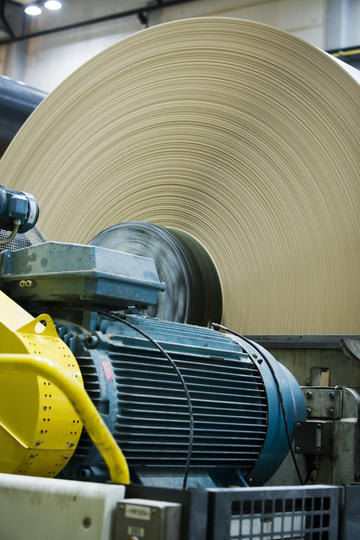Displaying items by tag: fuel
ABB takes industrial productivity to new heights
Award-winning ABB technology has improved productivity by 9 percent at a complex and energy-intensive industrial facility in Europe.
The improvements were made at Nordkalk's Lohja limestone processing plant in Finland and are indicative of the huge gains in productivity that are being achieved with an award-winning ABB process control and optimization solution for industrial facilities, Expert Optimizer.
Expert Optimizer has successfully delivered substantial improvements in productivity and energy efficiency at more than 200 production facilities worldwide and was awarded the Global Fuels Award for 'Most innovative technology for electrical energy efficiency' in 2008.
Originally developed for the cement industry but now available for all process industries, Expert Optimizer coordinates the optimal operating parameters of the various parts of the process and immediately detects any deviations that occur.
Once the deviations have been detected Expert Optimizer is able to stabilize and re-optimize the process. It is also able to calculate optimal production schedules for the entire plant. Typical increases in productivity range from 3-10 percent.
Nordkalk is the leading producer of high-quality limestone-based products in northern Europe. The company operates 20 sites in five countries. Lohja (above) in Finland is one of the largest. The site consists of an underground mine, crushing plant and lime kiln.
ABB took over site-wide maintenance activities at Lohja in 2006 as part of an ABB Full Service® contract in which it undertook to improve productivity and reduce maintenance costs at the plant, one of the largest limestone processing facilities in northern Europe.

ABB has more than 150 Full Service agreements in operation worldwide
Drawing on its expertise as the world's leading supplier of power, automation and optimization solutions for the cement industry, ABB was able to propose the installation of Expert Optimizer to help solve a production and fuel problem in the kiln, which is the heart of the lime-making process.
Prior to the installation of Expert Optimizer it had been difficult to determine the optimal operating point of the process as the kiln uses several different types of feed material, each with different properties. Expert Optimizer resolves this difficulty by finding the best operating conditions to maximize output and minimize fuel consumption for each type of feed.
The overall result was a 9 percent increase in production.
In a typical Full Service agreement ABB and the customer jointly agree on the targets to be achieved in areas like maintenance expenditure, plant availability, equipment reliability, energy efficiency and safety.
ABB has more than 150 Full Service agreements in operation in a broad spectrum of industries worldwide – from cement plants to petrochemical refineries, pulp and paper mills, oil and gas sites, steel mills, and consumer goods factories.
Linde MH delivers first trucks with fuel cells
 With the delivery of two fuel-cell trucks to the Linde Gases Division, part of technology company The Linde Group, Linde Material Handling has taken another important step on the road to more intensive use of innovative drive technology. As the first industrial truck manufacturer in Europe, Linde MH has incorporated fuel cell trucks into its product range. The trucks are now offered as standard and with immediate effect, as a "Customised Option".
With the delivery of two fuel-cell trucks to the Linde Gases Division, part of technology company The Linde Group, Linde Material Handling has taken another important step on the road to more intensive use of innovative drive technology. As the first industrial truck manufacturer in Europe, Linde MH has incorporated fuel cell trucks into its product range. The trucks are now offered as standard and with immediate effect, as a "Customised Option".
Both fuel-cell trucks are based on the 3-tonne electric counterbalanced truck, the Linde E30. In addition, the enhanced beverage industry version offers an optimised view over the load. In place of the usual 80-volt battery, the trucks have a fuel cell and a tank, which stores 1.6 kilograms of hydrogen gas at 350 bar. The electricity generated from the hydrogen supplies the electric motors that drive the truck. Alongside this are so-called supercaps, large condensers, which act as a buffer and cover performance peaks, such as pulling away or lifting, for example. The trucks bear the CE mark and are permitted for use on public roads. When it comes to performance data, the trucks are not different to the equivalent battery-powered model in the range and they are tailored specially to Linde Gas' customer requirements.
The fuel-cell trucks were developed over the last two years with long-term partner, Hydrogenics, the Canadian fuel cell manufacturer. Linde's contractual partner, Gruma Nutzfahrzeuge, based in Garching, near Munich, has been involved with the project from the beginning and is responsible for all issues related to servicing and maintaining the trucks. One of the trucks is used by Linde Gas for transporting Gas bottles between production halls and the truck embark point, which involves crossing a public road. The second fuel-cell truck operates in the field of gas bottle filling. Both trucks replace diesel trucks with a
3.5-tonne load capacity, which were previously used for this purpose. Filling up the fuel-cell trucks is quick and safe at the Linde hydrogen centre filling pump and is therefore comparable to filling a conventional truck.
The benefit of the fuel-cell drive for Linde Gas is the "zero emissions" that these trucks produce when used. The only waste product from the splitting of hydrogen molecules is pure water. Another benefit of fuel cells, in comparison to other drive concepts, is that there is no longer a requirement for battery replacement or a battery charging process lasting a number of hours. In the same way, the safety risks relating to the use of battery acid are removed. In order to be able to use the trucks, drivers only require an extra hour and a half driving lesson, along with a valid forklift licence for the advanced trucks.
